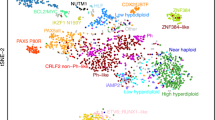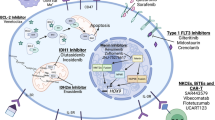Abstract
Olverembatinib represents the third-generation breakpoint cluster region protein-Abelson-murine leukemia 1 (BCR-ABL1) tyrosine kinase inhibitor with oral bioavailability, which can be used to overcome the T315I mutation in Philadelphia chromosome–positive (Ph +) leukemia. BCR-ABL-independent resistance to olverembatinib has been reported among patients in various clinical cases. However, the mechanism of olverembatinib resistance has rarely been reported. This study has illustrated bone marrow cell transcriptome and metabolome profiles among Ph + acute lymphoblastic leukemias (ALL) cases pre- and post-olverembatinib resistance. The transcriptome studies demonstrated that PI3K/AKT, purine metabolism, and other signaling pathways could play a vital role in olverembatinib resistance. As suggested by metabolomics, olverembatinib resistance in Ph + ALL was associated with purine metabolism alterations. Subsequently, high-performance liquid chromatography along with real-time quantitative PCR was utilized to measure purine metabolism-related mRNA levels and metabolism expression levels between olverembatinib resistance and sensitive cell lines. Our results elucidate the mechanism of olverembatinib resistance in Ph + ALL at transcriptome and metabolome levels, which facilitate a better understanding of olverembatinib resistance and hence may prove crucial in identifying novel drugs to tackle this conundrum.





Similar content being viewed by others
Data availability
The data that support the findings of this study are available from the corresponding author upon reasonable request.
Abbreviations
- Ph + :
-
Philadelphia chromosome positive
- RT-qPCR:
-
Real-time quantitative polymerase chain reaction
- LC/MS:
-
Liquid chromatograph mass spectrometer
- BCR-ABL1:
-
Breakpoint cluster region protein-Abelson-murine leukemia 1
- ALL:
-
Acute lymphoblastic leukemias
- CML:
-
Chronic myeloid leukemia
- TKIs:
-
Tyrosine kinase inhibitors
- CP:
-
Chronic phase
- BC:
-
Blast phase
- MR:
-
Molecular responses
- CHR:
-
Complete hematologic response
- OS:
-
Overall survival
- DFS:
-
Disease-free survival
- IM:
-
Imatinib mesylate
- AOEs:
-
Arterial occlusive events
- HF:
-
Heart failure
- MI:
-
Myocardial infarction
- FGFR:
-
Fibroblast growth factor receptor
- MMR:
-
Major molecular response
- KEGG:
-
Kyoto Encyclopedia of Genes and Genomes
- UPLC:
-
Ultra-high-performance liquid chromatography
- Q/TOF-MS:
-
Quadrupole time-of-flight tandem mass spectrometry
- MDR:
-
Multidrug resistance
- CAMs:
-
Cell adhesion molecules
- RNA-seq:
-
RNA-sequencing
- IBD:
-
Inflammatory bowel disease
- DEMs:
-
Differentially expressed metabolites
- GO:
-
Gene Ontology
- ABC:
-
ATP-binding cassette
- FPKM:
-
Fragments per kilobase of the exon model per million reads mapped
References
Abou Dalle I, Jabbour E, Short NJ et al (2019) Treatment of Philadelphia chromosome-positive acute lymphoblastic leukemia. Curr Treat Options Oncol 20(1):4. https://doi.org/10.1007/s11864-019-0603-z
Alves R, Gonçalves AC, Jorge J et al (2019) Everolimus in combination with Imatinib overcomes resistance in Chronic myeloid leukaemia. Med Oncol 36(3):30. https://doi.org/10.1007/s12032-019-1253-5
An S, Kumar R, Sheets ED et al (2008) Reversible compartmentalization of de novo purine biosynthetic complexes in living cells. Science 320(5872):103–106. https://doi.org/10.1126/science.1152241
Caocci G, Mulas O, Abruzzese E et al (2019) Arterial occlusive events in chronic myeloid leukemia patients treated with ponatinib in the real-life practice are predicted by the Systematic Coronary Risk Evaluation (SCORE) chart. Hematol Oncol 37(3):296–302. https://doi.org/10.1002/hon.2606
Dhillon S (2022) Olverembatinib: first approval. Drugs 82(4):469–475. https://doi.org/10.1007/s40265-022-01680-9
Di Virgilio F, Adinolfi E (2017) Extracellular purines, purinergic receptors and tumor growth. Oncogene 36(3):293–303. https://doi.org/10.1038/onc.2016.206
Fang DD, Zhu H, Tang Q et al (2022) FLT3 inhibition by olverembatinib (HQP1351) downregulates MCL-1 and synergizes with BCL-2 inhibitor lisaftoclax (APG-2575) in preclinical models of FLT3-ITD mutant acute myeloid leukemia. Transl Oncol 15(1):101244. https://doi.org/10.1016/j.tranon.2021.101244
Foà R, Chiaretti S (2022) Philadelphia chromosome-positive acute lymphoblastic leukemia. N Engl J Med 386(25):2399–2411. https://doi.org/10.1056/NEJMra2113347
Fukuda Y, Schuetz JD (2012) ABC transporters and their role in nucleoside and nucleotide drug resistance. Biochem Pharmacol 83(8):1073–1083. https://doi.org/10.1016/j.bcp.2011.12.042
Jabbour E, Kantarjian H (2022) Chronic myeloid leukemia: 2022 update on diagnosis, therapy, and monitoring. Am J Hematol 97(9):1236–1256. https://doi.org/10.1002/ajh.26642
Jabbour E, Haddad FG, Short NJ et al (2022) Treatment of adults with philadelphia chromosome-positive acute lymphoblastic leukemia-from intensive chemotherapy combinations to chemotherapy-free regimens: a review. JAMA Oncol 8(9):1340–1348. https://doi.org/10.1001/jamaoncol.2022.2398
Jiang Q, Li Z, Qin Y et al (2022) Olverembatinib (HQP1351), a well-tolerated and effective tyrosine kinase inhibitor for patients with T315I-mutated chronic myeloid leukemia: results of an open-label, multicenter phase 1/2 trial. J Hematol Oncol 15(1):159. https://doi.org/10.1186/s13045-022-01334-z
Karigane D, Kobayashi H, Morikawa T et al (2016) p38α activates purine metabolism to initiate hematopoietic stem/progenitor cell cycling in response to stress. Cell Stem Cell 19(2):192–204. https://doi.org/10.1016/j.stem.2016.05.013
Lai Y, Lu N, Luo S et al (2022) A photoactivated sorafenib-ruthenium(II) prodrug for resistant hepatocellular carcinoma therapy through ferroptosis and purine metabolism disruption. J Med Chem 65(19):13041–13051. https://doi.org/10.1021/acs.jmedchem.2c00880
Liu Y, Li C, Su R et al (2021) Targeting SOS1 overcomes imatinib resistance with BCR-ABL independence through uptake transporter SLC22A4 in CML. Mol Ther Oncolytics 236(9):6312–6327. https://doi.org/10.1016/j.omto.2021.11.010
Ma D, Liu P, Wang P et al (2021) PKC-β/Alox5 axis activation promotes Bcr-Abl-independent TKI-resistance in chronic myeloid leukemia. J Cell Physiol 236:6312–6327. https://doi.org/10.1002/jcp.30301
Mitchell R, Hopcroft LEM, Baquero P et al (2018) Targeting BCR-ABL-independent TKI resistance in chronic myeloid leukemia by mTOR and autophagy inhibition. J Natl Cancer Inst 110(5):467–478. https://doi.org/10.1093/jnci/djx236
Nayeem MA, Hanif A, Geldenhuys WJ et al (2022) Crosstalk between adenosine receptors and CYP450-derived oxylipins in the modulation of cardiovascular, including coronary reactive hyperemic response. Pharmacol Ther 240:108213. https://doi.org/10.1016/j.pharmthera.2022.108213
Nishimura T, Nakata A, Chen X et al (2019) Cancer stem-like properties and gefitinib resistance are dependent on purine synthetic metabolism mediated by the mitochondrial enzyme MTHFD2. Oncogene 38(14):2464–2481. https://doi.org/10.1038/s41388-018-0589-1
Otto T, Sicinski P (2017) Cell cycle proteins as promising targets in cancer therapy. Nat Rev Cancer 17(2):93–115. https://doi.org/10.1038/nrc.2016.138
Quentmeier H, Eberth S, Romani J, Zaborski M, Drexler HG (2011) BCR-ABL1-independent PI3Kinase activation causing imatinib-resistance. J Hematol Oncol 4:6. https://doi.org/10.1186/1756-8722-4-6
Rangatia J, Bonnet D (2006) Transient or long-term silencing of BCR-ABL alone induces cell cycle and proliferation arrest, apoptosis and differentiation. Leukemia 20(1):68–76. https://doi.org/10.1038/sj.leu.2403999
Ren X, Pan X, Zhang Z et al (2013) Identification of GZD824 as an orally bioavailable inhibitor that targets phosphorylated and nonphosphorylated breakpoint cluster region-Abelson (Bcr-Abl) kinase and overcomes clinically acquired mutation-induced resistance against imatinib. J Med Chem 56(3):879–894. https://doi.org/10.1021/jm301581y
Rocha KC, Vieira ML, Beltrame RL et al (2016) Impact of selenium supplementation in neutropenia and immunoglobulin production in childhood cancer patients. J Med Food 19(6):560–568. https://doi.org/10.1089/jmf.2015.0145
Rodrigues ACBDC, Costa RGA, Silva SLR, Dias IRSB, Dias RB, Bezerra DP (2021) Cell signaling pathways as molecular targets to eliminate AML stem cells. Crit Rev Oncol Hematol 160:103277. https://doi.org/10.1016/j.critrevonc.2021.103277
Roskoski R Jr (2022) Targeting BCR-Abl in the treatment of Philadelphia-chromosome positive chronic myelogenous leukemia. Pharmacol Res 178:106156. https://doi.org/10.1016/j.phrs.2022.106156
Saleh K, Fernandez A, Pasquier F (2022) Treatment of Philadelphia chromosome-positive acute lymphoblastic leukemia in adults. Cancers 14(7):1805. https://doi.org/10.3390/cancers14071805
Sasaki K, Kantarjian HM, Short NJ et al (2021) Prognostic factors for progression in patients with Philadelphia chromosome-positive acute lymphoblastic leukemia in complete molecular response within 3 months of therapy with tyrosine kinase inhibitors. Cancer 127(15):2648–2656. https://doi.org/10.1002/cncr.33529
Soares AS, Costa VM, Diniz C et al (2015) Inosine strongly enhances proliferation of human C32 melanoma cells through PLC-PKC-MEK1/2-ERK1/2 and PI3K pathways. Basic Clin Pharmacol Toxicol 116(1):25–36. https://doi.org/10.1111/bcpt.12280
Suzuki M, Abe A, Imagama S et al (2010) BCR-ABL-independent and RAS / MAPK pathway-dependent form of imatinib resistance in Ph-positive acute lymphoblastic leukemia cell line with activation of EphB4. Eur J Haematol 84(3):229–238. https://doi.org/10.1111/j.1600-0609.2009.01387.x
Yang T, Sim KY, Ko GH et al (2022) FAM167A is a key molecule to induce BCR-ABL-independent TKI resistance in CML via noncanonical NF-κB signaling activation. J Exp Clin Cancer Res 41(1):82. https://doi.org/10.1186/s13046-022-02298-1
Yerges-Armstrong LM, Ellero-Simatos S, Georgiades A et al (2013) Purine pathway implicated in mechanism of resistance to aspirin therapy: pharmacometabolomics-informed pharmacogenomics. Clin Pharmacol Ther 94(4):525–532. https://doi.org/10.1038/clpt.2013.119
Zhou S, Schuetz JD, Bunting KD et al (2001) The ABC transporter Bcrp1/ABCG2 is expressed in a wide variety of stem cells and is a molecular determinant of the side-population phenotype. Nat Med 7(9):1028–1034. https://doi.org/10.1038/nm0901-1028
Funding
This study was supported by the Guangzhou Science and Technology Plan Project (No. 202002030404, 202102020423, 202201020245, 202201020340, 202201020241, 202201011281), the Foundation of Guangdong Second Provincial General Hospital (No. 3DB2020014, YQ2020-002, 2021018, and TJGC-2021011), Doctoral Workstation Foundation of Guangdong Second Provincial General Hospital (No. 2020BSGZ048 and 2021BSGZ017), Natural Science Foundation of Guangdong Province (No. 2021A1515012329), Guangdong Basic and Applied Basic Research Foundation (No. 2020A1515010002, 2021A1515110430), Science and Technology Planning Project of Guangdong Province of China (No. 2021B1212030008), and Key Program for the National Natural Science Foundation of China (No. 82202034).
Author information
Authors and Affiliations
Contributions
H.J. and Y.Z. conceived the project, designed the studies, performed all experiments, wrote the original draft of the manuscript; review and editing, L.-M.Y. and Y.-R.R; validation, Z.-Y.M., Z.Q., and L.S; formal analysis, Z.-Y.M. and L.-M.Y.; investigation, L.Z., H.-J., and W.H.; data curation, Z.-Y.M. and L.Z.; visualization, Y.Z.; writing original draft preparation, YZ.; resources, supervised the studies, L.S; supervision, O.-R.M. and Z.Q.; project administration, Z.-Y.M., L.S., and Y.-R.R; funding acquisition, L.S, Y.Z, and Z-Y.M. All authors read and approved the final article.
Corresponding authors
Ethics declarations
Competing interests
The authors declare no competing interests.
Ethics approval
The study was performed in accordance with the ethical standards as laid down in the Declaration of Helsinki and approved by the ethics committee of the Guangdong Second Provincial General Hospital of Jinan University (2022-KY-KZ-288–01).
Conflict of interest
The authors declare no competing interests.
Additional information
Publisher's note
Springer Nature remains neutral with regard to jurisdictional claims in published maps and institutional affiliations.
Supplementary Information
Below is the link to the electronic supplementary material.
Rights and permissions
Springer Nature or its licensor (e.g. a society or other partner) holds exclusive rights to this article under a publishing agreement with the author(s) or other rightsholder(s); author self-archiving of the accepted manuscript version of this article is solely governed by the terms of such publishing agreement and applicable law.
About this article
Cite this article
Yin, Z., Liao, M., Yan, R. et al. Transcriptome- and metabolome-based candidate mechanism of BCR-ABL-independent resistance to olverembatinib in Philadelphia chromosome–positive acute lymphoblastic leukemia. Funct Integr Genomics 23, 53 (2023). https://doi.org/10.1007/s10142-023-00980-x
Received:
Revised:
Accepted:
Published:
DOI: https://doi.org/10.1007/s10142-023-00980-x




